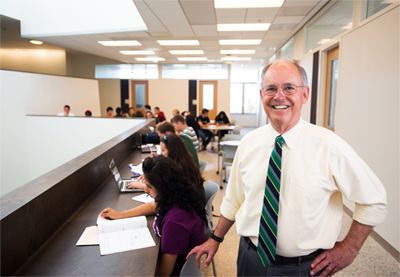A Message from Dean Bailey

Welcome to Cal Poly’s College of Science and Mathematics and thank you for visiting our website. I came to Cal Poly in 1969 as a 26-year old assistant professor in the Department of Chemistry and Biochemistry where I still teach almost every quarter. I have been especially privileged to be Dean of the College of Science and Mathematics since 1983. I am probably the longest tenured current employee at Cal Poly and I can tell you from years of experience that this is absolutely a wonderful place.
Cal Poly was established in 1901 initially as a polytechnic high school. Shortly thereafter programs were expanded to offer a junior college curriculum as well which led eventually to four year degrees. Today, the once polytechnic high school, the institution that at one time aspired to be a polytechnic college of 5000 all male students, is now a nationally respected polytechnic co-educational university of almost 20,000 students that finds itself listed annually among the nation’s best colleges and universities including in publications such as US News and World Report.
Cal Poly’s values and those of the College of Science and Mathematics are clear. We are a hands-on, learn by doing institution with a sincere commitment to undergraduate education. Modern and innovative pedagogies and curricula engage our students’ intellect, curiosity, imagination, and capacity for creative and critical thought. Our classes are small and students learn to know our faculty members well through daily contact in lecture, labs, office hours and other activities. The sophisticated equipment and instrumentation we place in undergraduate science labs is uncommon at most institutions and makes possible lab experiences with a strong intellectual base. We encourage partnerships between our students and the faculty in scholarly and creative endeavors that nurture the imagination and creativity of our students, support the professional development agendas of our faculty, and promote personal mentoring within our university community.

Dean Bailey teaching chemistry.
We have strong master’s degree programs that prepare students for careers and teacher education programs housed in the College that focus on science and mathematics education. In addition to a superb faculty, we have an excellent professional support staff that truly cares about student success and participates in countless ways to assist in student growth and achievement.
Science and mathematics are the foundation of the polytechnic curriculum and every Cal Poly student takes courses offered by the College. In the College of Science and Mathematics we consider every Cal Poly student as one of ours. Just as science and mathematics are central to the polytechnic curriculum, symbolically all of our departments are located at the geographic center of the campus. In fact, the new Warren J. Baker Center for Science and Mathematics currently under construction will be the second largest building at Cal Poly when it is completed in 2013 and, along with Centennial Park, is destined to be one of the university’s defining landmarks.
Let me take a moment to speak specifically to current or prospective students and their families. Cal Poly is one of the most selective public universities in California and the United States. Any student who gains acceptance is capable of earning a degree and we are dedicated to guiding each and every one to this achievement. However, it is important to understand that learning is truly a personal responsibility. Faculty members at any university are intellectual guides, academic mentors. They can guide in the process of learning but obviously cannot learn for the student. Students must re-discover and re-invent every concept for themselves and be able to express their personal understanding. One cannot play the piano after merely watching someone.
This has to personally discovered and learned and practiced until competency is achieved. One does not master calculus merely by watching an instructor construct proofs or do problems. Calculus, like the piano, must be personally mastered. A calculus instructor cannot

Dean Bailey at commencement.
work the problems for you, just as no one could train for you if you wanted to run a 10K race. These are personal responsibilities and require time and commitment whether one is exercising the body or the mind or both. Some years ago I developed the 25-35 program at Cal Poly. It recommends that our students study 25-35 hours a week to ensure true learning and academic success and is described on the Academic Success page.
I hope you will explore our departments and programs, centers and institutes, and the focus the College has on excellence in science and mathematics teacher education. There are opportunities for everyone in the Cal Poly community that lead to academic, personal, and professional growth and achievement. Again, thank you for visiting the College of Science and Mathematics.
Phil Bailey, Dean
College of Science and Mathematics


